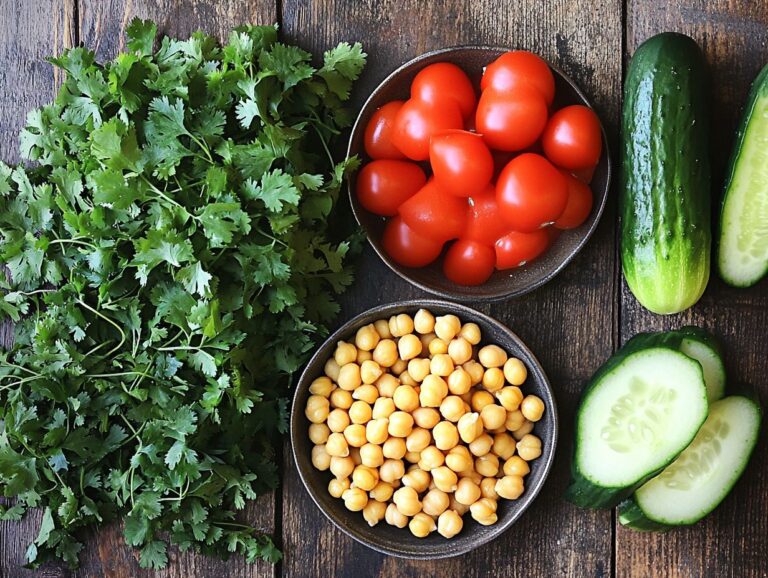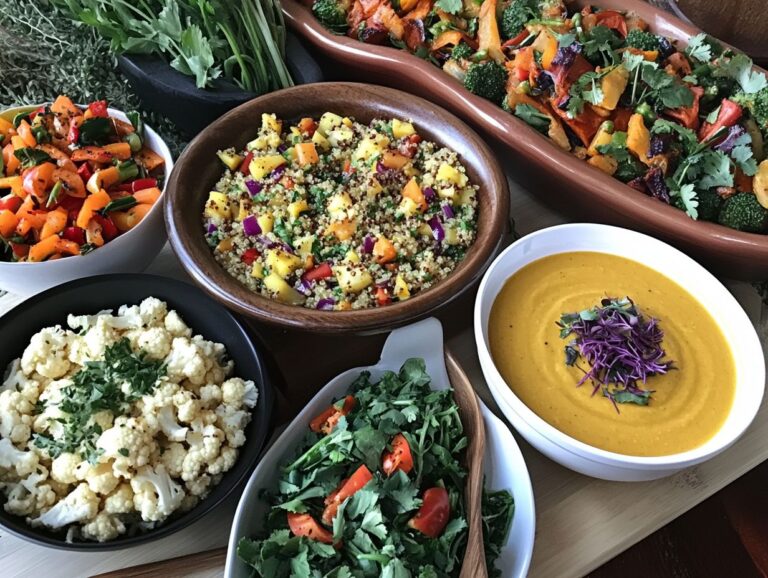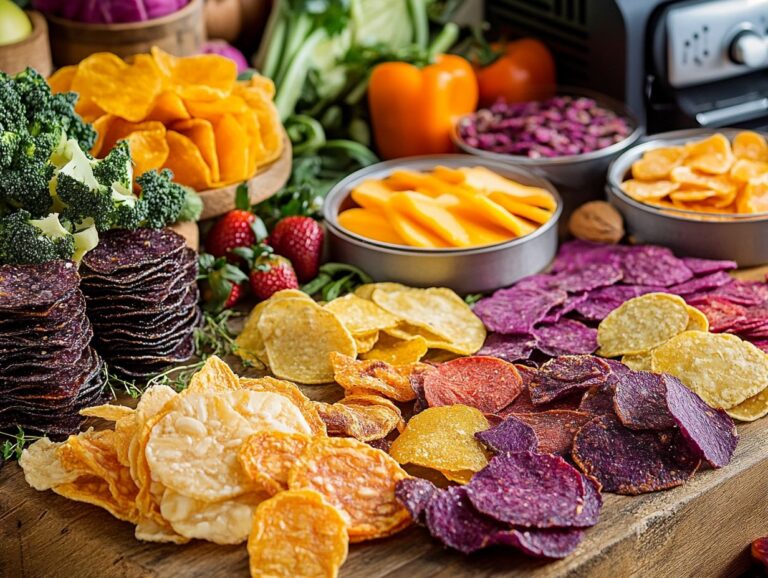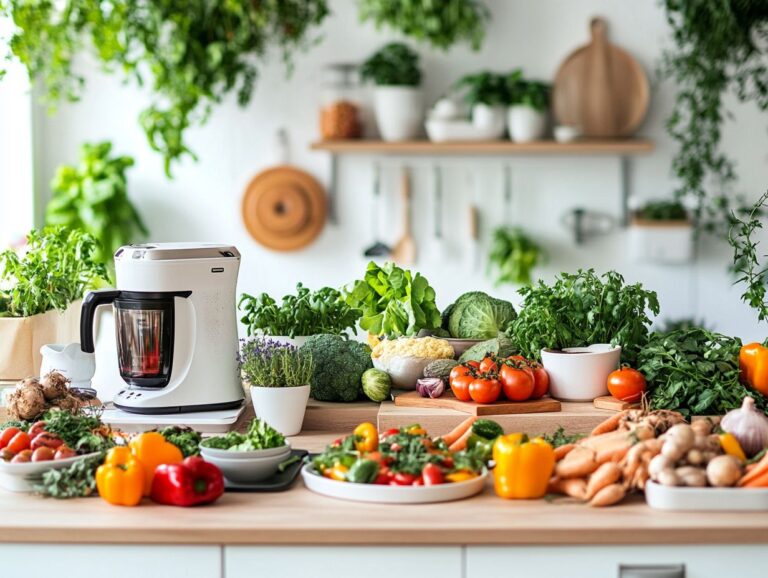Polycystic Ovary Syndrome (PCOS) affects many women and can cause a range of symptoms that disrupt daily life. Adopting a vegan diet, including dairy-free and gluten-free options, may serve as a powerful tool for managing these symptoms and promoting hormonal balance. This article will explain what PCOS is, explore the role of phytoestrogens in plant-based diets, and how these diets can help alleviate its effects. It will explore essential nutrients vital for hormonal health, share delicious vegan recipes for every meal, and provide tips for creating a balanced meal plan. Additionally, the article will discuss lifestyle changes that complement dietary choices, including exercise, stress management techniques, and the importance of portion control and mindful eating. Get ready to enable yourself with knowledge and discover delicious options for managing PCOS!
Understanding PCOS and Vegan Diet
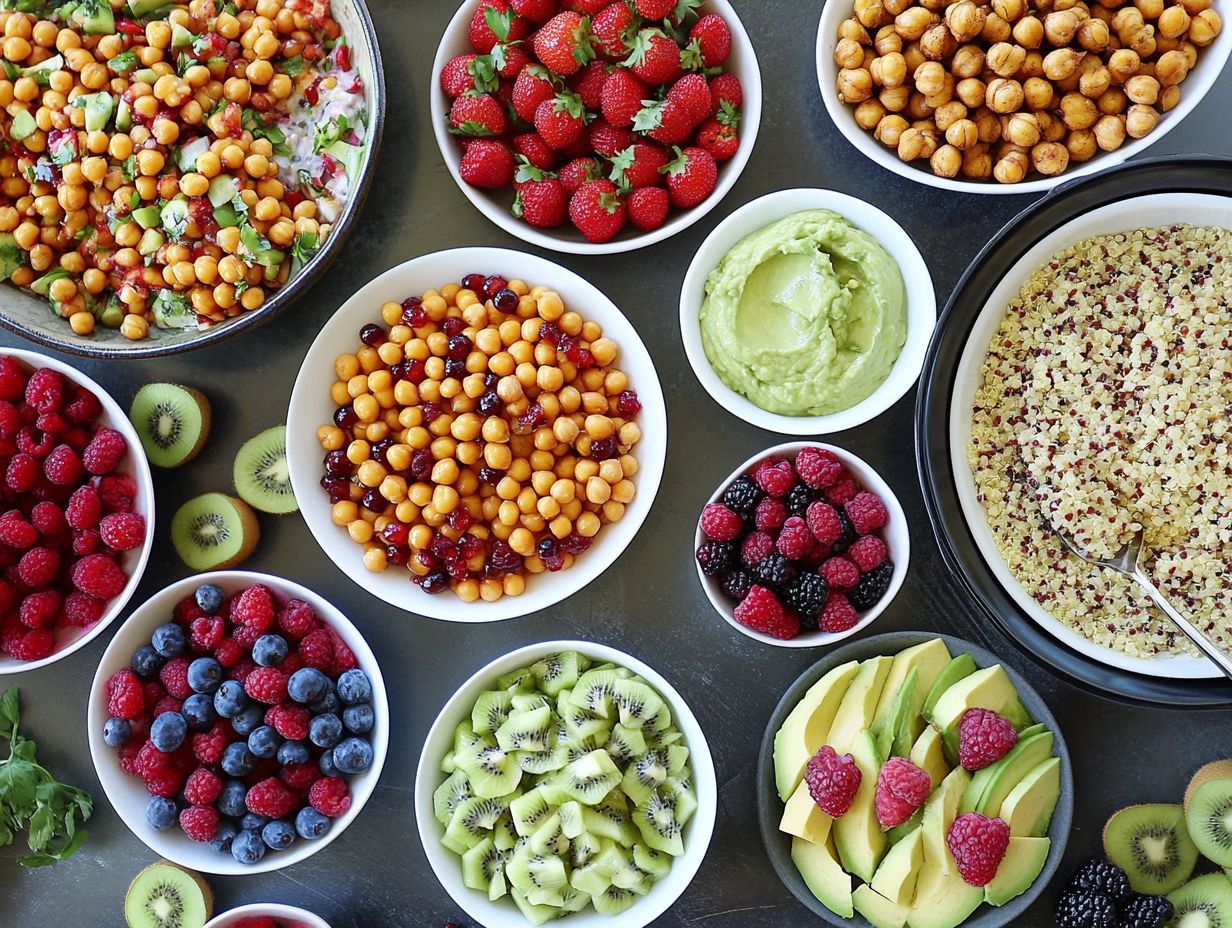
Polycystic Ovary Syndrome (PCOS) is a complex hormonal disorder that affects a considerable number of individuals and presents symptoms such as irregular menstrual cycles, cramping, acne, insulin resistance, and hormonal imbalance.
Adopting a vegan diet, which is rich in plant-based foods and emphasizes fiber-rich foods, offers a holistic approach to managing the symptoms of PCOS by promoting hormonal balance and overall health. This lifestyle choice emphasizes the consumption of whole foods, including fruits, vegetables, legumes, seeds, and healthy fats.
These foods can help alleviate symptoms associated with PCOS while also supporting the endocrine system.
What is PCOS and How Does a Vegan Diet Help?
Polycystic Ovary Syndrome (PCOS) is a hormonal disorder marked by irregular periods, elevated androgen levels, and the presence of polycystic ovaries. This condition can lead to insulin resistance, weight gain, and mood swings, affecting various aspects of an individual’s health and contributing to long-term complications such as type 2 diabetes and cardiovascular disease.
Effective management of PCOS symptoms often requires a holistic approach, including effective meal planning, and adopting a vegan diet can provide significant benefits. Focusing on high-fiber and anti-inflammatory foods can help regulate hormonal balance and improve insulin sensitivity.
Incorporating plant-based foods such as lentils, chickpeas, and quinoa can ensure an adequate intake of essential nutrients, while fruits like berries are rich in antioxidants and provide immune support. Additionally, leafy greens, nuts, and seeds can further support overall hormonal health, promoting a balanced lifestyle that mitigates some of the adverse effects associated with this syndrome.
Key Nutrients for Managing PCOS
Key nutrients essential for managing PCOS include those that promote hormone balance, support hormonal health, and enhance overall health. Incorporating PCOS-friendly vitamins and minerals into a vegan diet can help alleviate PCOS symptoms and contribute to a healthier lifestyle.
Nutrients such as fiber, omega-3 fatty acids, and antioxidants from whole foods like fruits, vegetables, legumes, and healthy fats play a vital role in improving insulin sensitivity and supporting the endocrine system.
Important Vitamins and Minerals for Hormonal Balance
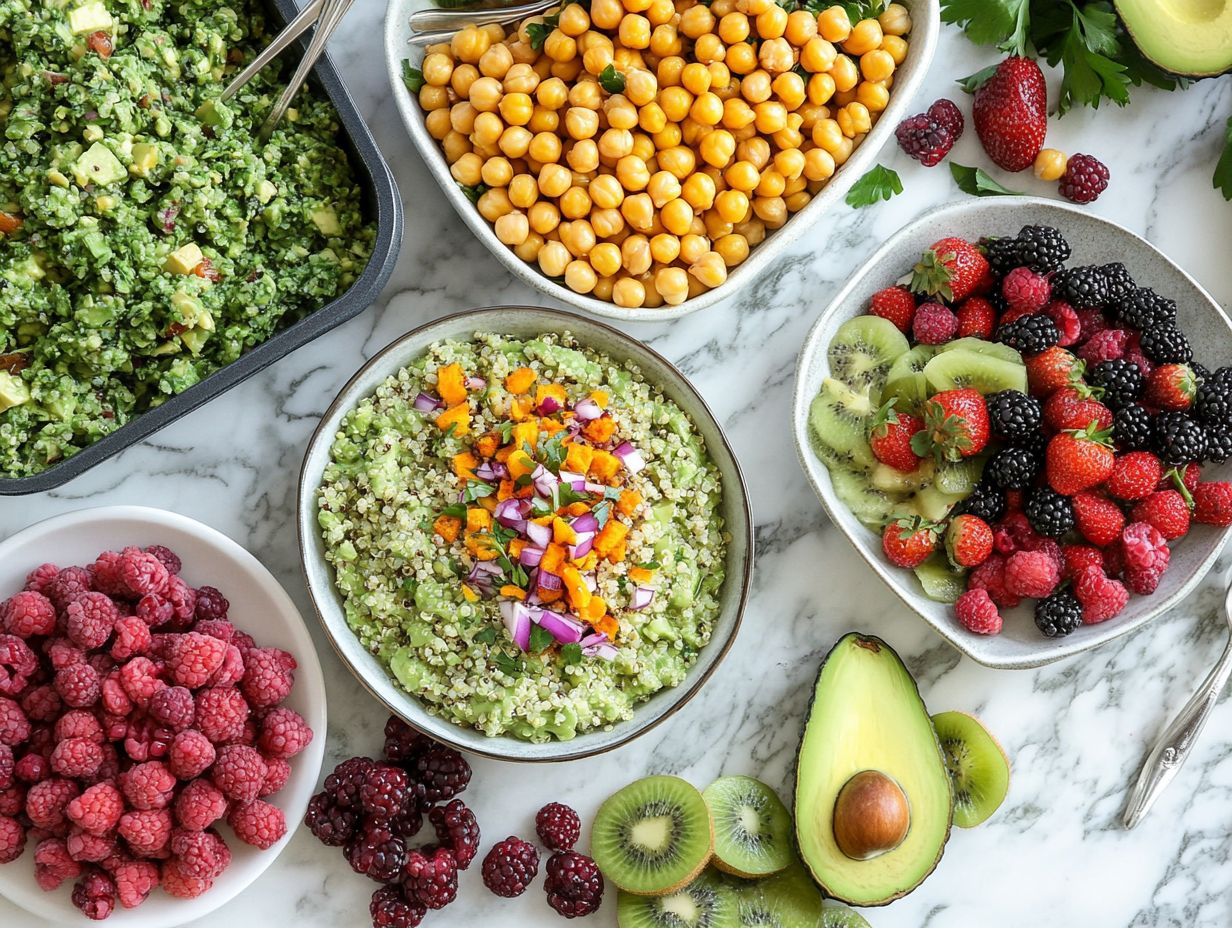
Certain vitamins and minerals are essential nutrients that can help improve hormonal balance, support digestive health, and contribute to better health outcomes for individuals with PCOS. For instance, Vitamin D plays a crucial role in insulin sensitivity and the regulation of the menstrual cycle; low levels of this vitamin are linked to increased symptoms of PCOS.
Individuals with PCOS should include sources of Vitamin D, such as fortified plant-based milks, and ensure they receive adequate sunlight exposure.
B vitamins, particularly B6 and B12, are also important as they help control mood, reduce stress, and support energy levels, which can exacerbate hormonal imbalances. A healthy vegan diet should include sources such as legumes, whole grains, and nutritional yeast to meet B vitamin needs.
Additionally, magnesium and zinc play vital roles in adrenal function, immune support, and hormone production; these minerals can be abundantly found in nuts, seeds, and leafy green vegetables.
Vegan Recipes for PCOS Management
Having a variety of vegan recipes and recipe ideas is essential for managing PCOS, as they can ensure that meals are both nutritionally balanced and enjoyable.
These recipes should focus on whole foods that are rich in fiber, protein, and healthy fats, helping individuals regulate their hormones through their diet and maintain a low glycemic index.
It is important for meals to incorporate seasonal ingredients, budget-friendly options, and culinary creativity, making it easier for people to prepare dishes that support their health and lifestyle while enjoying the cooking process.
Breakfast Recipes
Nourishing vegan breakfast recipes and breakfast options can help manage PCOS symptoms by providing a great start to the day. These recipes typically include ingredients that are high in fiber and healthy fats, which help maintain energy levels, digestive health, and curb cravings.
- Smoothies: You can prepare delicious and creamy smoothies using spinach, avocado, and flaxseeds, which are excellent vegan protein sources. These smoothies are packed with omega-3 fatty acids and essential vitamins.
- Oatmeal Bowls: Oatmeal bowls topped with mixed berries, almond butter, and seeds offer a wonderful combination of antioxidants and protein, while their bulk aids in digestion and nutrient absorption.
- Chia Seed Puddings: Chia seed puddings, made the night before with plant-based milk, are easy to prepare. They provide omega-3 fatty acids and fiber, which help stabilize blood sugar levels.
These wholesome and simple recipes not only nourish the body but also promote better hormonal balance.
Lunch Ideas
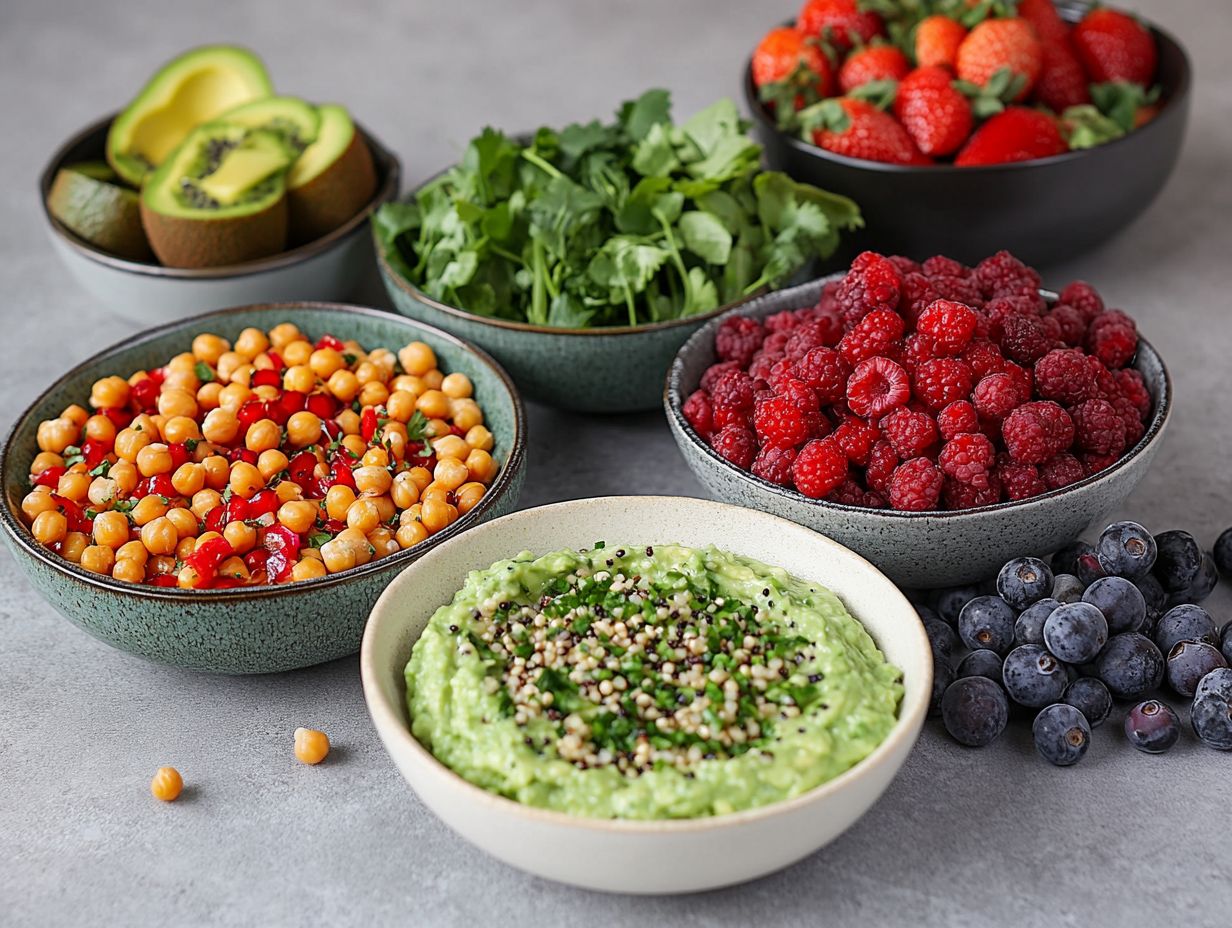
Vegan lunch recipes are not only healthy and easy to prepare, but they can also be made in advance, making them ideal for managing PCOS, supporting weight management, and maintaining stable energy levels throughout the day.
These whole food meals are simple to prepare in large batches, ensuring that nutrient-dense meals are available even when busy schedules leave little time for healthy choices. By using ingredients such as quinoa, legumes, and vibrant vegetables, meals can be both delicious and nutrient-dense.
Planning meals ahead of time can save both time and willpower. One effective strategy is to dedicate an hour or two each week for a meal prep session. This allows for a variety of bases, proteins, and dressings to be mixed and matched throughout the week, keeping meals interesting.
For instance, a basic quinoa bowl can be enhanced with roasted chickpeas, a variety of seasonal greens, or a zesty tahini dressing, and improved with thoughtful food pairing for optimal health benefits. These meals can be tailored to personal tastes and nutritional needs, making it easier and more enjoyable to eat healthily with colorful and satisfying lunches.
Dinner Recipes
Wholesome vegan dinner recipes are essential for maintaining balanced meals that meet nutritional needs, help manage PCOS, and provide comfort and satisfaction at the end of the day. These recipes can incorporate protein-rich ingredients, healthy fats, and fiber, contributing to both physical and emotional well-being, and can incorporate diverse cooking techniques. Hearty soups, stir-fries, and grain bowls are excellent dinner options.
Incorporating seasonal ingredients into vegan dinner recipes can enhance flavors and increase the nutritional value of meals. For instance, a delicious winter vegetable stew can include root vegetables like carrots and parsnips, with lentils added for protein. A refreshing quinoa salad featuring spring greens, nuts, and a citrusy dressing can instantly elevate any meal with vibrant flavor profiles.
Additionally, herbs and spices can enhance the flavor while offering a variety of health benefits, supporting both the immune system and digestive health. By making these choices, you ensure that each dinner is not only nutritious but also enjoyable.
Snack and Dessert Recipes
The following healthy vegan snacks and desserts for PCOS are beneficial in reducing cravings while providing essential nourishment and energy levels between meals. They incorporate healthful ingredients such as nut butters, fruits, seeds, and plant proteins, ensuring that you indulge without resorting to unhealthy options.
These snacks and desserts can support a balanced diet and help meet both caloric needs and psychological satisfaction related to healthy eating, while respecting dietary restrictions. They serve as a means to increase caloric intake when necessary, all while avoiding unhealthy foods.
Keeping a variety of these healthy snacks and desserts on hand can be useful for managing moods when cravings arise. Each recipe combines flavor and nutrition, helping you navigate your day without unnecessary emotional swings.
These simple and healthy alternatives to traditional foods promote a healthy lifestyle, enhance holistic health, and help prevent unwanted sugar cravings.
Creating a Balanced Vegan PCOS Meal Plan
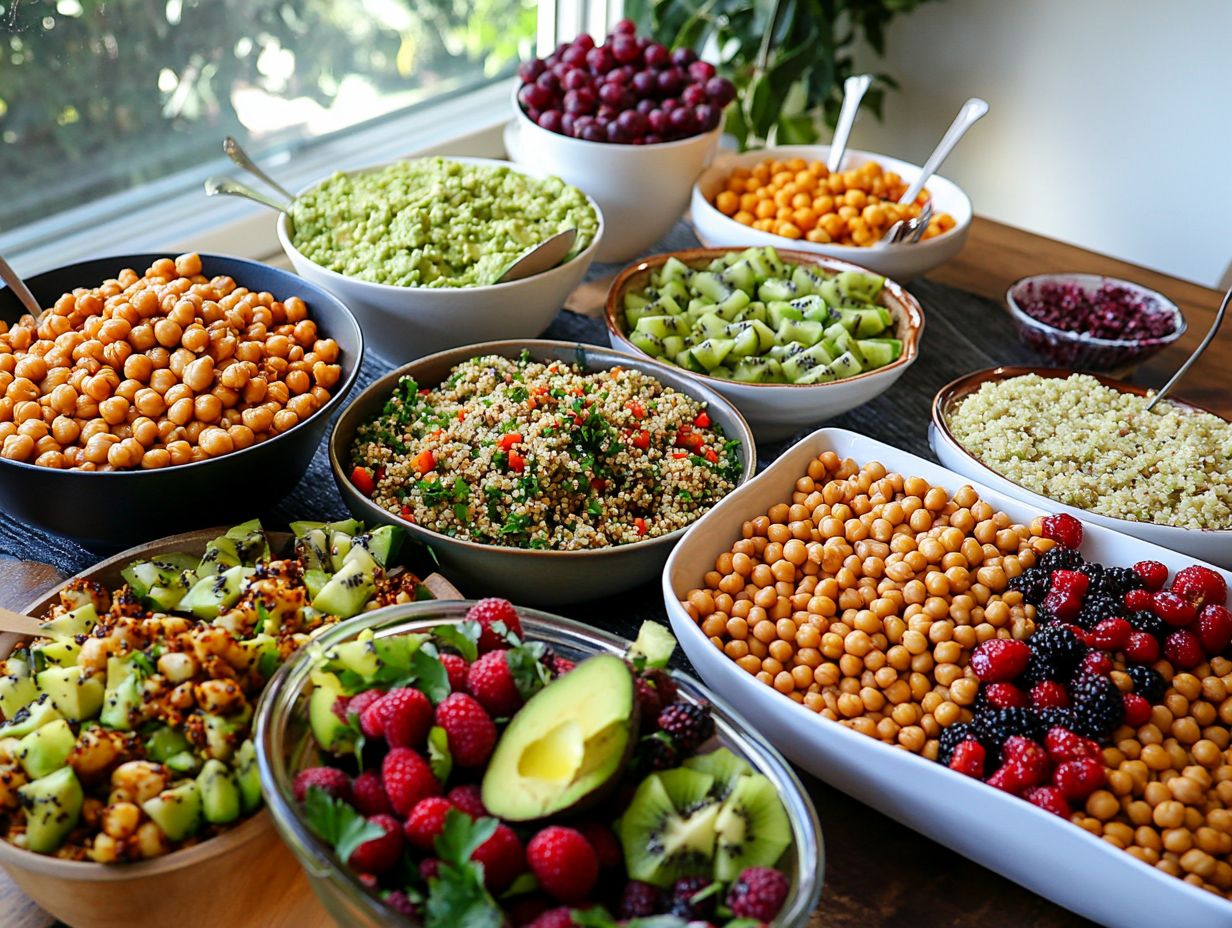
A balanced vegan meal plan, incorporating low-carb recipes, is essential for managing PCOS, as it provides the proper nutrition needed to address hormonal imbalances.
Incorporating a diverse array of foods rich in vitamins, minerals, and fiber is crucial for developing a diet that helps improve health, manage symptoms, and support lifestyle changes.
Utilizing meal prep and cooking methods can facilitate this process, ensuring that dietary goals are achieved without sacrificing enjoyment.
Tips for Planning Nutritious Meals
Effective meal planning and meal timing are crucial for maintaining a healthy vegan diet that meets the specific needs of individuals with PCOS. By incorporating seasonal ingredients and focusing on whole foods, meal planning can become a simple and enjoyable experience.
Key tips for successful meal planning include:
- Creating a grocery list and understanding food labeling
- Batch cooking
- Employing proper food storage techniques to reduce waste, maximize freshness, and support sustainable eating
Additionally, it is beneficial to include specific foods that support hormonal balance, fertility, and digestive health, such as legumes, leafy greens, and healthy fats like avocados and nuts. Choosing organic produce, whole grains, and vegetarian options during grocery shopping can also contribute to healthier outcomes.
Recipe modifications can enhance meals; for instance, using nut-based milk instead of dairy and adding spices like cinnamon can help stabilize blood sugar levels. Incorporating fiber-rich foods such as legumes and whole grains can also aid in blood sugar control and support insulin resistance management.
Furthermore, connecting with community support through online forums or local meet-ups can provide motivation, inspiration, and shared experiences, making the meal planning process even easier for those with PCOS following a vegan diet. Exploring plant-based diet options and learning about their health benefits can enhance dietary variety and culinary creativity.
Lifestyle Changes for Managing PCOS
Making lifestyle changes is crucial for managing the symptoms of PCOS and enhancing an individual’s quality of life. Engaging in regular exercise, utilizing stress management techniques, and adopting self-care practices, including mindful eating and hydration, are all essential components of a holistic approach to overall health.
These strategies can aid in regulating menstrual cycles, improving insulin sensitivity, and promoting emotional balance.
Exercise and Stress Management Techniques
Regular exercise and stress management techniques are essential for individuals with PCOS, as they can help alleviate symptoms and support hormonal balance. Incorporating activities such as yoga, walking, and strength training not only assists in managing symptoms and weight but also enhances emotional well-being. Including healthy fats like omega-3 fatty acids in the diet can further support hormonal health.
Mindfulness practices, including meditation and deep breathing exercises, effectively relieve stress and promote an overall healthy lifestyle. Exploring various forms of exercise can enable those with PCOS.
Aerobic activities such as cycling and dancing improve cardiovascular health and enhance insulin sensitivity, both of which are crucial for reducing symptoms. Resistance training is beneficial as it builds muscle mass and increases metabolic rate, making it an effective strategy for maintaining a healthy weight. Incorporating balanced meals with phytoestrogens and antioxidants can also support overall wellness.
Additionally, stress management techniques like progressive muscle relaxation and guided imagery can be particularly helpful, providing a calming effect that encourages emotional balance and resilience.
Overall, these approaches contribute to a comprehensive framework for improved wellness. Focusing on nutrient-dense meals and incorporating seasonal ingredients, along with exploring vegetarian options and gluten-free recipes, can aid in achieving dietary goals.
